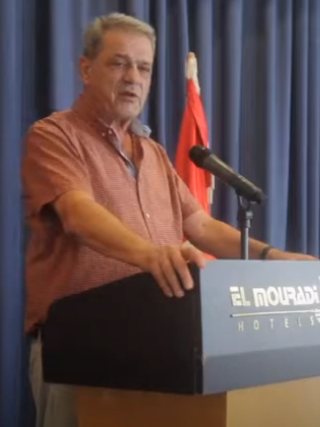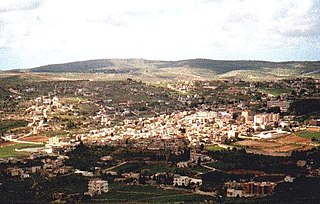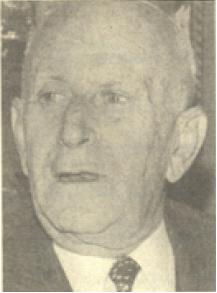Lebanon is a parliamentary democratic republic within the overall framework of confessionalism, a form of consociationalism in which the highest offices are proportionately reserved for representatives from certain religious communities. The constitution of Lebanon grants the people the right to change their government. However, from the mid-1970s until the parliamentary elections in 1992, the Lebanese Civil War (1975–1990) precluded the exercise of political rights.

Nabih Mustafa Berri is a Lebanese politician who has been serving as Speaker of the Parliament of Lebanon since 1992. He heads the Amal Movement and its parliamentary wing, Development and Liberation Bloc.

The Marada Movement is a Lebanese political party and a former militia active during the Lebanese Civil War named after the legendary Marada warriors of the early Middle Ages that fought on the external edge of the Byzantine Empire. Originally designated the Marada Brigade, the group initially emerged as the personal militia of Suleiman Frangieh, president of Lebanon at the outbreak of the war in 1975, which also had a Parliamentary wing known as the Frangieh Bloc. They were also initially known as the Zgharta Liberation Army, after Frangieh's hometown of Zgharta in northern Lebanon.

The Democratic Left Movement is a nonsectarian and a democratic leftist political party. It was founded in September 2004 by left-wing and center-left intellectuals and activists some of whom had previously split from the Lebanese Communist Party (LCP) while some were student activists from the "Independent Leftist Groups". The DLM affirms a European-style social democracy—but is open to all forms of leftism and encourages the development of a true secular state. The party operates under a decentralized framework that emphasizes diversity of thought for a progressive society in a liberal democratic environment. It participated in the 2005 Cedar Revolution, a wave of demonstrations against the Syrian occupation of Lebanon, and calls for correcting imbalanced relations with Syria.

Najah Wakim is a Lebanese politician who served as member of parliament from 1972 to 2000. He is the president of the People's Movement.

Bint Jbeil is the second largest town in the Nabatiye Governorate in Southern Lebanon.
Muhammad Fneish is a Shia Lebanese politician and member of Hezbollah. He represented Hezbollah in the Third Cabinet of Saad Hariri, serving as the Minister of Sports and Youth.

Kamel Bey El-Assaad was a Lebanese politician and za'im.
Ali Ahmad Bazzi Abu an is a member of the Lebanese Parliament. He represents the Bint Jbeil district of South Lebanon. Year 2000–present.

Parliamentary elections were held in Iran on 13 March 1980, with a second round on 9 May. They were the first elections to the Majlis since the overthrow of the Shah, and were contested to a considerable degree on a party basis.
General elections were held in Lebanon on 15 April 1951, with a second round in some constituencies on 22 April. Independent candidates won the majority of seats. Voter turnout was 54.7%. The governing party, Constitutional Bloc, did not have a clear organization, so it is difficult to determine the number of its members who participated in this election. Nonetheless, the government backed three "Constutional" lists in Mount Lebanon and had 14 of their 22 candidates elected. Former Constitutionalist minister Camille Chamoun became an opposition candidate in an alliance with Kamal Jumblatt.
General elections were held in Lebanon between 12 July and 9 August 1953, the first under the new electoral system which allowed candidates to win with a plurality of votes, rather than requiring a second round. Independent candidates won the majority of seats. Voter turnout was 50.0%.

Parliamentary elections were held in the Yemen Arab Republic on 5 July 1988. As political parties were banned, all 1,300 candidates for the 128 seats ran as independents. Around 40 seats were won by tribal candidates, whilst around 30 were won by candidates sympathetic to the Muslim Brotherhood. After the election, a further 31 members were appointed by the President. Voter turnout was 77%.

Beirut II was a parliamentary constituency in Lebanon. It covered three neighbourhoods (quartiers) in the north-eastern parts of the capital; Port, Medawar and Bachoura. The constituency elected four members of the National Assembly. Two of the Beirut II MPs had to be Armenian Orthodox, 1 Sunni Muslim and 1 Shia Muslim. The constituency was created with the 2008 Doha Agreement, ahead of the 2009 parliamentary election.
Muhammad Baydoun was a moderate Lebanese politician and served as a member of the Lebanese parliament from 1992 until 2005. He also served as minister of power and energy as recently as 2005. He participated in many rallies organized by the 14 March coalition.

Beirut II was a parliamentary constituency in Lebanon. It covered three neighbourhoods (quartiers) of the capital; Dar El Mreisse, Zuqaq al-Blat and Bachoura. Michael Hudson described Beirut II as a 'small "catch-all" district'. This constituency was used in the 1960, 1964, 1968 and 1972 elections.

Bint Jbeil electoral district was an electoral district in Lebanon. It covered all areas of the Bint Jbeil District. The constituency elected three Shia Muslim members of the Parliament of Lebanon.
The Bourj Hammoud electoral district or the Eight Constituency was an electoral district in Lebanon, used in the 1953 parliamentary election. The district elected a single Armenian Orthodox parliamentarian.

Kazem Ismail al-Khalil - commonly known as Kazem al-Khalil or Kazem el-Khalil, also transliterated Kazim from the Arabic - was a lawyer, doyen member of the Lebanese parliament, seven-time minister of the Lebanese government and right-wing militia-leader from a Shiite feudal dynasty in Southern Lebanon.

General elections were held in Lebanon on 15 May 2022 to elect all 128 members of the Lebanese Parliament. The country has for several years been the subject of chronic political instability as well as a serious economic crisis aggravated by the 2020 explosions that hit the Port of Beirut and faced large-scale demonstrations against the political class.











